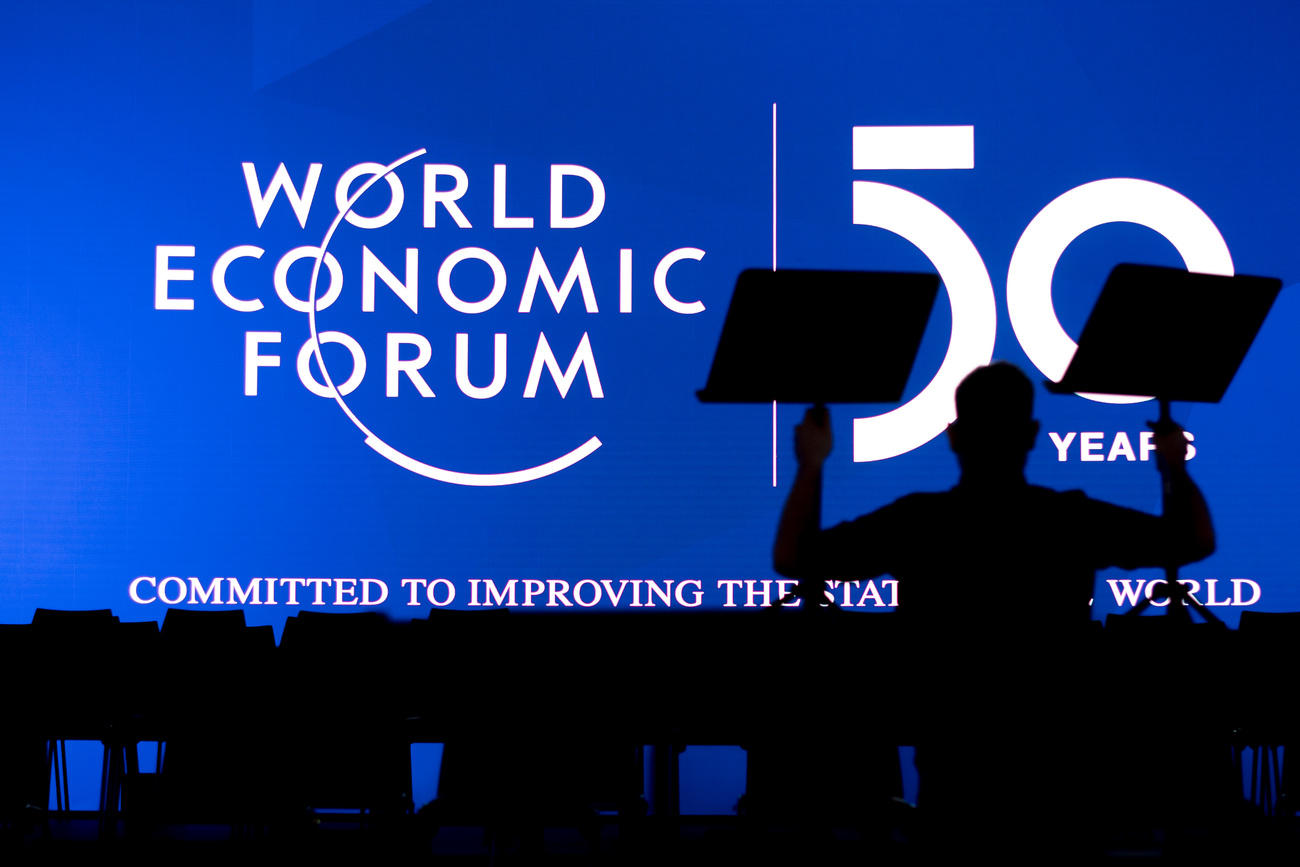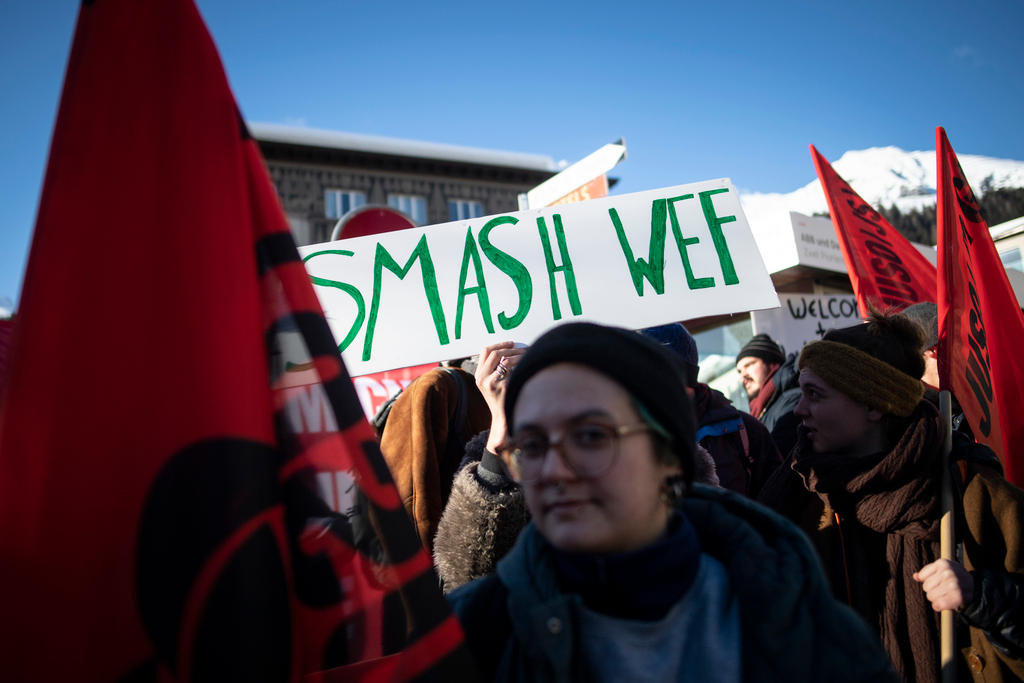Climate protestors take the long road to Davos

As a symbol of elite global capitalism, Switzerland’s World Economic Forum has always attracted fervent opposition. For its 50th bash, the trend continues with a 40-kilometre march to Davos.
To celebrate the golden anniversary edition of WEF in 2020, protestors have prepared something special, as is clear outside the train station in the eastern Swiss town of Landquart on Sunday morning.
Some 500 have gathered on the square: young, old, and most things in between, swaddled against the cold, many holding the type of homemade placards familiar from global climate strikes.
Between bursts of Irish folk songs performed (with Swiss accents) by local duo ‘The Balladeering Tinkers’, climate activists and anti-WEFfers take to the stage in swift succession to demand, generally speaking, “system change, not climate change”.
There are also more classic WEF refrains. “Time to abolish billionaires!” cries Njoki Njehu from Kenya, as Landquart locals poke heads and phones out of nearby apartments.
Njehu herself actually has an invite to Davos, and is about to go there to try to tackle the system from the inside, by hobnobbing with the very billionaires she wants to abolish.
“Please pray for me,” she says, and the crowd, who has no invite to Davos, laughs.
Winter hike
Most of those gathered will never get invited, but this doesn’t deter them. They’re planning to head up and gate-crash it anyway: not by train, nor private helicopter, but on foot.
The Landquart demo marks the start of the “Winterwanderung”, a three-day protest trek to highlight the climate emergency, and the responsibility – both for causing it, and now for fixing it – of the business and political 1%.
The first stage, Sunday, brings the group to Schiers, 11 kilometres down the road; the second is a hefty 22km to the town of Klosters; and the final leg on Tuesday is a disputed (at time of writing) 14-km stretch into the heart of global capitalism in Davos.
Swedish teen activist Greta Thunberg, who had been in Lausanne for a climate demo two days before and was expected in Landquart, is unfortunately a no-show. But her name still makes waves, and plenty of journalists are on site: local reporters, cameras from Swiss national broadcaster RTS, even a crew from Chinese network CGTN.
And, at 13:30, off they go.

Inside or outside the tent
Of course, WEF is no stranger to protests. Every year sees opposition and demos in Switzerland, much of it by far-left groups who take issue with global capitalism generally.
But the nature of the protests has shifted. For one thing, the violence of the anti-globalisation sentiment at the start of the century, which took aim at events like WEF and the G20, has somewhat subsided. Even the more hardcore far-left demos – like a 1,000-strong march in Bern over the weekend – often pass off without too much violence.
Over the years, WEF has also been good at bringing more pragmatic forms of dissent from outside to inside the tent, as it did when it started including civil society, through NGOs, as important part of its multi-stakeholder model around the turn of the century.
Thunberg, who will be attending Davos this year (travelling by bus, apparently) is an obvious example.
Another, Micah White, the founder of the Occupy Wall Street movement, was almost arrested during an anti-WEF protest in New York in 2002. This year he’s attending Davos, where he’s participating on panels including “how to turn protest into progress”.
“For me, attending Davos will most likely be reputational suicide: a sign that I have done something wrong, sold out or been compromised,” White wroteExternal link a few weeks ago.
He recognises that participating can mean losing one’s initial fervour. “Activists rightly fear being co-opted: the elite’s dinner table is the graveyard of passion for revolution,” he goes on.
And yet he does cooperate, if not allow himself be co-opted, because, he says, in the past decade the nature of the problems facing humanity have shifted from being political (and antagonistic) to being existential (we are all in the same boat).
“Existential threats require a scale of mobilisation that can only be achieved through the active collaboration of the people with the powerful,” he says.
‘What do we want? Climate justice!’
And this seems to be another way in which the protests are shifting: back at Sunday’s march, the focus is not on tricky questions of multi-stakeholder models, nor on the question of which economic system to support, but rather on the existential threat of our time – climate.
Walking along a narrow forest road a few kilometres east of Landquart, amid chants and clanging cowbells and a stereo blasting out Queen, the hikers’ main concern is the lack of a “planet B” rather than Marxist theories of overthrowing hegemony.
“What do we want? Climate justice! When do we want it? Now!” is the most frequent chant.
In their eyes, climate and capitalism, and thus Davos, have become linked. Elena, marching with her boyfriend, says that “we live in an open system, where every action has an effect.” But instead of raging against globalisation, she says that in a globalised world we need to have a “collective awareness” instead of aiming to maximise personal profits.
Kai, who travelled from Frankfurt in Germany for the Winterwanderung, says the elite in Davos know exactly what is happening to the climate, but their pursuit of profit means they won’t change anything.
“I hope that [with this march] we can give them a sign, put a bit of pressure on them,” he says, before adding that he’s also here to “have some fun and meet new people”.
This is another part of the march, of course, which is neither purely pragmatic, nor idealistic, nor solely about the climate. Some just want to express themselves, and many feel part of a like-minded community.
In the village of Grüsch, a man dressed as Ronald McDonald drops his placard (“Run away from exploitation; join the clown army!”), tops up his lipstick in the rear-view mirror of a parked squad car, then buffs the windscreen as a young policeman looks on helplessly.
A Portuguese and a Spaniard discuss, cheerily, how long it took them to reach Switzerland by bus and train.
A few kilometres out from Schiers, a koala bear complains that his ankles are giving out under the weight of his huge backpack; his neighbour consoles him.

Message received?
As for the protest organisers, who go under the name of “Strike WEF”, they have chosen to target Davos because, as they claim in Landquart, “100 businesses are responsible for 71% of global emissions since 1988” – businesses that are often members of the forum.
They hope to draw attention to this not only through the colourful walk, but also by organising informational events in the towns stayed in along the way. They will also join a larger demonstration happening in Davos on Tuesday.
Will it work?
If they hope to remind WEF that the climate is in a state of emergency and that attendees are the ones that need to fix it, then this might already be a moot point. Countless panels in Davos are focused on the issue, and the top five threats in the recently-released WEF Global Risks report, a sort of elite handbook of worldwide problems, are climate-related.
Even the Davos event itself claimsExternal link to have made itself carbon-neutral this year.
And so, whether anything concrete comes out of the protests remains to be seen. Many are sceptical of their efficacy, especially at a time when protests seem to be everywhere, and about every issue.
But on the climate score, at least, WEF and its protestors are talking about the same thing, even if they are still coming at it from different sides of the mountain.

In compliance with the JTI standards
More: SWI swissinfo.ch certified by the Journalism Trust Initiative












You can find an overview of ongoing debates with our journalists here . Please join us!
If you want to start a conversation about a topic raised in this article or want to report factual errors, email us at english@swissinfo.ch.